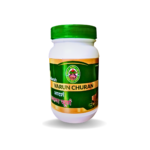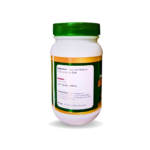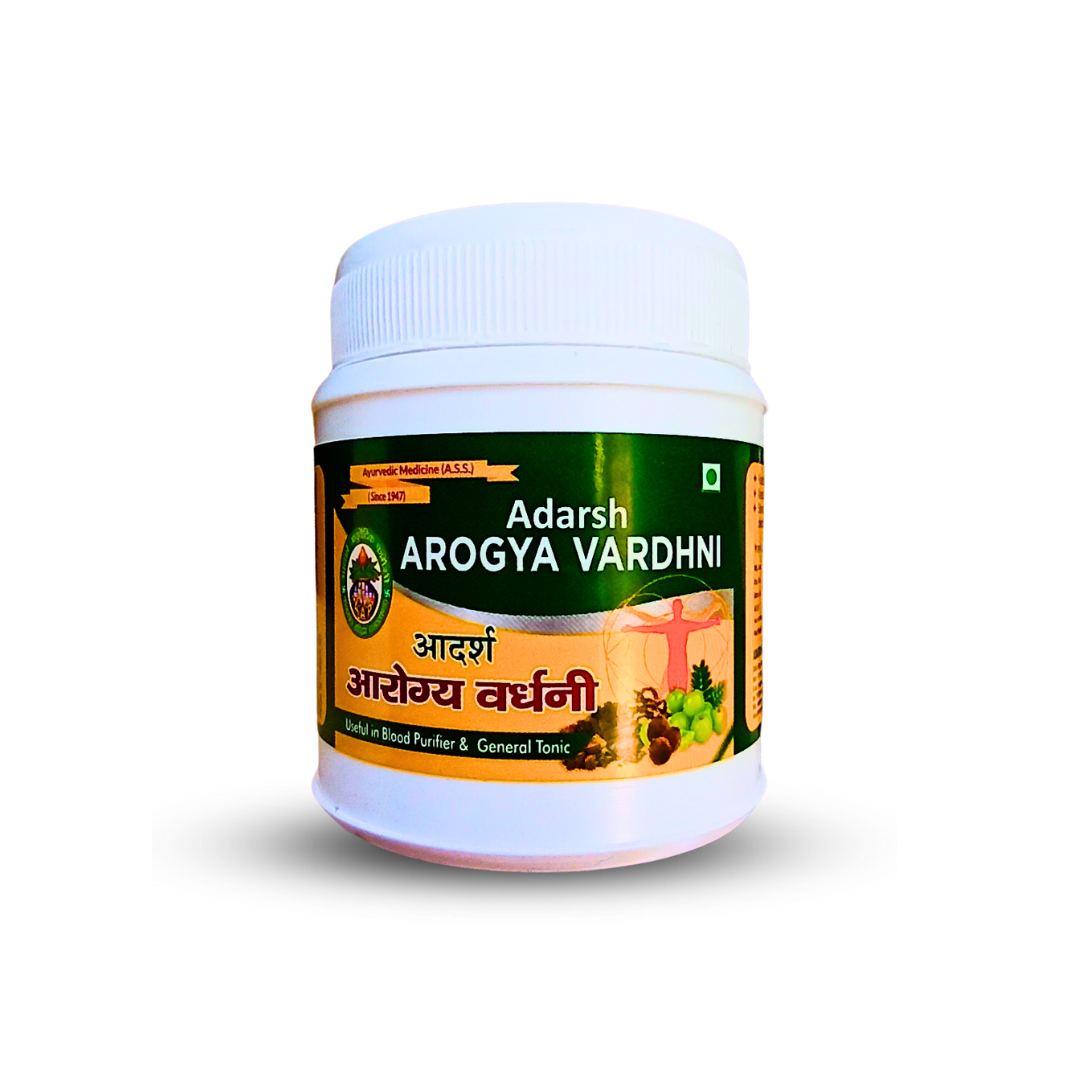Varun Churan
₹100
Varun, also known as Crataeva nurvala, is a tree that is commonly used in Ayurvedic medicine for its medicinal properties. The bark of the Varun tree is particularly useful in treating urinary tract infections (UTIs) and kidney stones.
The bark of the Varun tree has diuretic properties, which means it can help increase the production of urine and improve the function of the urinary tract. This can help flush out toxins and bacteria that may be causing a UTI or kidney stone.
- Delivery & Return
Delivery
We ship to all over the world. All orders are shipped with a UPS tracking number. Always free shipping for orders over 1000. During sale periods and promotions the delivery time may be longer than normal.Return
Adarsh Ayurvedic Pharmacy will accept exchanges and returns of undamaged box within 30 days of the date of purchase (14 days during the sales period), on presentation of the original till receipt at any store where the corresponding collection is available within the country of purchase. Your return will usually be processed within a week to a week and a half. We’ll send you a Return Notification email to notify you once the return has been completed. Please allow 1-3 business days for refunds to be received to the original form of payment once the return has been processed.Help
Give us a shout if you have any other questions and/or concerns. Email: aapdeepak.hdr@gmail.com Phone: 9897902760
Varun, also known as Crataeva nurvala, is a tree that is commonly used in Ayurvedic medicine for its medicinal properties. The bark of the Varun tree is particularly useful in treating urinary tract infections (UTIs) and kidney stones.
The bark of the Varun tree has diuretic properties, which means it can help increase the production of urine and improve the function of the urinary tract. This can help flush out toxins and bacteria that may be causing a UTI or kidney stone.
To use Varun bark, it is typically ground into a powder and consumed orally. It can also be added to hot water to make a tea. Varun bark is often used in combination with other herbs to treat UTIs and kidney stones.
The bark of the Varun tree has diuretic properties, which means it can help increase the production of urine and improve the function of the urinary tract. This can help flush out toxins and bacteria that may be causing a UTI or kidney stone.
Buy 10 get one free.
Selflife: 3 Years
| Weight | 250 g |
|---|---|
| Dimensions | 14 × 12.5 × 8.5 cm |
| Weight | 100gm |
Based on 0 reviews
|
|
|
0% |
|
|
|
0% |
|
|
|
0% |
|
|
|
0% |
|
|
|
0% |
Only logged in customers who have purchased this product may leave a review.
Related Products
Rasanasaptak Kwath is an Ayurvedic herbal decoction made from a combination of seven herbs, including Ashwagandha (Withania somnifera), Shatavari (Asparagus racemosus), and Guduchi (Tinospora cordifolia).
According to Ayurvedic principles, Rasanasaptak Kwath is believed to help support overall health and well-being by promoting healthy digestion, improving immunity, and reducing inflammation in the body. It is commonly used to help manage symptoms associated with arthritis, joint pain, and other inflammatory conditions.
Rasanasaptak Kwath is typically prepared by boiling the herbal mixture in water and then straining the decoction before consuming. It is important to note that like all herbal remedies, Rasanasaptak Kwath should be taken under the guidance of a qualified healthcare professional, as it may interact with certain medications or have potential side effects in some individuals.
Marichiyadi Tail is typically applied topically to the affected area and gently massaged into the skin. The frequency and duration of use can vary based on individual needs and the guidance of a qualified healthcare professional. It is important to note that like all herbal remedies, Marichiyadi Tail may cause allergic reactions or other side effects in some individuals, and should be used with caution.
Marichiyadi Tail is an Ayurvedic herbal oil that is made from a blend of several herbs, including Marich (Black pepper), Ajwain (Trachyspermum ammi), and Karpura (Camphor). This oil is commonly used in Ayurvedic medicine for the treatment of joint pain, muscle pain, and stiffness.
Chandanbala Lakshadi Tail is typically applied topically to the affected joint areas and gently massaged into the skin. The frequency and duration of use can vary based on individual needs and the guidance of a qualified healthcare professional. It is important to note that like all herbal remedies, Chandanbala Lakshadi Tail may cause allergic reactions or other side effects in some individuals, and should be used with caution.
Chandanbala Lakshadi Tail is an Ayurvedic herbal oil made from a blend of several herbs, including Chandan (Sandalwood), Bala (Sida cordifolia), and Laksha (Laccifer lacca). The oil is commonly used in Ayurvedic medicine to help relieve joint pain and inflammation.
Dashmool Ghan is typically taken orally and the dosage and duration of treatment may vary depending on the individual’s needs and the practitioner’s recommendations. It is important to consult with a qualified Ayurvedic practitioner before using Dashmool Ghan, especially if you have a history of medical conditions or are currently taking any medications.
Additionally, it is important to be aware of potential side effects and contraindications before using any herbal supplement. Dashmool Ghan is believed to have several health benefits, particularly for the respiratory and nervous systems. The primary active compounds in Dashmool Ghan include alkaloids, flavonoids, and triterpenoids, which are believed to have anti-inflammatory, analgesic, and antioxidant properties. Dashmool Ghan is commonly used in Ayurvedic medicine for reducing inflammation, pain, and anxiety, and promoting overall health and wellness.
Arjuna Ghan is typically taken orally in liquid form, and the dosage and duration of treatment may vary depending on the individual’s needs and the practitioner’s recommendations. It is important to consult with a qualified Ayurvedic practitioner before using Arjuna Ghan, especially if you have a history of medical conditions or are currently taking any medications. Additionally, it is important to be aware of potential side effects and contraindications before using any herbal supplement.
The primary active compounds in Arjuna Ghan include flavonoids, tannins, and triterpenoids, which are believed to have antioxidant and anti-inflammatory properties. Arjuna Ghan is commonly used in Ayurvedic medicine for supporting healthy cardiovascular function, maintaining healthy blood pressure, and reducing cholesterol levels.
Pramehgaj Kesari is believed to have anti-diabetic properties, which can help in regulating blood sugar levels and preventing complications associated with diabetes. It is also believed to have a rejuvenating effect on the body, promoting overall health and well-being.
However, it is essential to note that the use of Pramehgaj Kesari should be done under the guidance of a qualified Ayurvedic practitioner. Overdose or incorrect usage can cause adverse effects like low blood sugar levels, stomach upset, and nausea. It is also not recommended for pregnant and lactating women and people with liver or kidney problems.
Ashwagandha Ghan is typically taken orally in liquid form, and the dosage and duration of treatment may vary depending on the individual’s needs and the practitioner’s recommendations. It is important to consult with a qualified Ayurvedic practitioner before using Ashwagandha Ghan, especially if you have a history of medical conditions or are currently taking any medications. Additionally, it is important to be aware of potential side effects and contraindications before using any herbal supplement.
The primary active compounds in Ashwagandha Ghan include withanolides, alkaloids, and flavonoids, which are believed to have adaptogenic, anti-inflammatory, and antioxidant properties. Ashwagandha Ghan is commonly used in Ayurvedic medicine for reducing stress and anxiety, supporting healthy immune function, and promoting overall vitality and wellness.
Maha Narayan Tail is typically applied topically to the affected area and gently massaged into the skin. The frequency and duration of use can vary based on individual needs and the guidance of a qualified healthcare professional. It is important to note that like all herbal remedies, Maha Narayan Tail may cause allergic reactions or other side effects in some individuals, and should be used with caution.
Maha Narayan Tail is an Ayurvedic herbal oil that is made from a blend of several herbs, including Bala (Sida cordifolia), Ashwagandha (Withania somnifera), and Manjistha (Rubia cordifolia). This oil is commonly used in Ayurvedic medicine for the treatment of joint pain, muscle pain, and stiffness.
Swas Chintamani Ras (also spelled as Swas Kas Chintamani Ras) is a traditional Ayurvedic medicine that is used to treat respiratory disorders, such as asthma, bronchitis, and cough. It is typically made from a combination of minerals such as purified mercury, sulfur, and mica, along with herbs like vasa, yashtimadhu, and pippali.
However, it’s important to note that the use of Ayurvedic medicines should be done under the guidance of a qualified Ayurvedic practitioner, as they can be potentially harmful if not used properly. Additionally, the safety and efficacy of these medicines have not been evaluated by the FDA, so caution should be exercised when using them.
Swas Chintamani Ras (also spelled as Swas Kas Chintamani Ras) is a traditional Ayurvedic medicine that is used to treat respiratory disorders, such as asthma, bronchitis, and cough. It is typically made from a combination of minerals such as purified mercury, sulfur, and mica, along with herbs like vasa, yashtimadhu, and pippali.
However, it’s important to note that the use of Ayurvedic medicines should be done under the guidance of a qualified Ayurvedic practitioner, as they can be potentially harmful if not used properly. Additionally, the safety and efficacy of these medicines have not been evaluated by the FDA, so caution should be exercised when using them.
Basant Kusumakar Ras is believed to work by regulating blood sugar levels, improving digestion, and strengthening the immune system. It is also used to treat urinary tract infections, liver disorders, and pancreatitis. However, it is important to note that Basant Kusumakar Ras should only be taken under the guidance of a qualified Ayurvedic practitioner, as it may have some side effects and interactions with other medications.
It is a herbo-mineral formulation that contains various natural ingredients, including Swarna Bhasma (gold ash), Rajat Bhasma (silver ash), Vanga Bhasma (tin ash), and other herbs such as Haritaki (Terminalia chebula), Bibhitaki (Terminalia bellirica), Amalaki (Emblica officinalis), Shuddha Shilajit (purified asphaltum), and Guggulu (Commiphora mukul).
Pathyadi Kwath is an Ayurvedic herbal decoction made from a blend of several herbs, including Haritaki (Terminalia chebula), Bibhitaki (Terminalia bellirica), and Shunti (Zingiber officinale).
According to Ayurvedic principles, Pathyadi Kwath is believed to help support respiratory health, particularly in cases of cough and cold. It is also commonly used to support digestive health, promote healthy metabolism, and alleviate symptoms associated with inflammation.
Supari Pak is a herbal Ayurvedic formulation that is commonly used in traditional Indian medicine. It is a sweet and spicy powder made from various herbs and spices, with betel nut (supari in Hindi) being the primary ingredient.
Some of the key ingredients in Supari Pak include betel nut, cardamom, cinnamon, clove, ginger, and honey. These ingredients are believed to have a range of health benefits, such as improving digestion, reducing inflammation, boosting the immune system, and promoting healthy reproductive function.
Supari Pak is typically taken in small doses, usually one to two teaspoons a day.






























Reviews
There are no reviews yet.